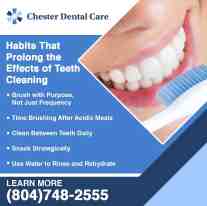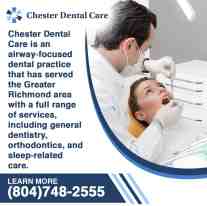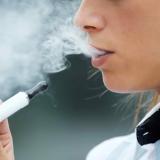At Chester Dental Care, we take teeth cleaning seriously because it serves a purpose beyond just making your smile look polished. A dental cleaning, also known as prophylaxis, involves removing plaque and tartar buildup, polishing the enamel, and, if necessary, applying fluoride. During these visits, we also examine your gums, check for cavities, and monitor any changes in your oral health over time.
Cleaning teeth thoroughly helps protect more than just your smile. When tartar is removed, your risk of gum disease drops considerably. A clean mouth also means fewer bacteria entering your bloodstream, which benefits your overall health, including your cardiovascular and respiratory systems. Many people search for teeth cleaning nearby because they know these visits are a foundation for long-term health.
But the real value of dental cleaning depends on what happens afterward. We've seen excellent results fade quickly when patients don't maintain good habits at home. At Chester Dental Care, we help you extend the benefits of your cleaning by focusing on personalized aftercare. In the next section, we'll explain how daily habits, both good and bad, can support or sabotage your progress.
Key Takeaways from Chester Dental Care
-
Professional cleanings do more than polish your smile.
A teeth cleaning removes plaque, prevents gum disease, and allows us to catch small problems early before they require major treatment.
-
Skipping aftercare leads to higher dental costs.
Without daily flossing and brushing, plaque builds up quickly. The cost of treating advanced gum disease or decay far exceeds the average cost of teeth cleaning.
-
Proper brushing technique protects your enamel.
Brushing too hard, too soon after acidic foods, or with a worn brush can damage enamel. Small adjustments make cleaning teeth at home more effective.
-
Simple daily habits preserve your cleaning results.
Drinking more water, choosing better snacks, and flossing once a day all reduce buildup and extend the effects of your professional care.
-
Preventive care saves money and protects health.
The average cost of teeth cleaning is low compared to the expense of fillings, root planing, or extractions, making consistency a smart long-term investment.
The Real Cost of Skipping Aftercare
Many patients ask us about the average cost of teeth cleaning, hoping to manage their dental expenses responsibly. What often gets overlooked, though, is how much more it can cost when aftercare is ignored. At Chester Dental Care, we've seen how skipping the basics, like daily flossing or waiting too long between visits, can turn a routine cleaning into more complex procedures.
Short-term neglect can quickly lead to long-term problems. According to the Centers for Disease Control and Prevention (CDC), nearly half of all adults over 30 already show signs of gum disease. Left untreated, this condition progresses silently, often without pain, until it's advanced. At that point, cleaning teeth isn't enough. Patients may require deep cleanings (scaling and root planing), gum surgery, or even tooth replacement.
Here's the reality: prevention is almost always more affordable than treatment. The average cost of teeth cleaning is modest, especially when compared to procedures that follow years of neglect. Investing in regular maintenance keeps costs low and outcomes predictable.
At Chester Dental Care, we encourage patients to protect that investment by following practical aftercare habits. In the next section, we'll break down the small, daily steps that make the biggest difference in keeping your mouth healthy between visits.

Our Top Home Care Habits That Preserve a Cleaning
At Chester Dental Care, we remind every patient that what happens at home matters just as much as what we do in the office. Clinical teeth cleaning gives you a fresh start, but daily habits are what keep it going. Cleaning teeth effectively between visits helps prevent plaque buildup, gum irritation, and early signs of decay.
Below, we'll share five simple strategies that help preserve the benefits of professional teeth cleaning. When combined with routine care in our office, these habits can make each cleaning last longer and reduce your need for additional treatment.
Brush With Purpose, Not Just Habit
Brushing twice a day is a basic routine, but it's only effective when done correctly. We often see patients who brush regularly yet still develop plaque or early gum irritation. The problem usually comes down to technique, not frequency.
To get the most out of cleaning teeth at home, use a soft-bristled brush angled at 45 degrees toward the gumline. Gentle circular motions, not aggressive scrubbing, are more effective at removing plaque without harming enamel or gums. Aim for at least two full minutes per session, covering all surfaces, front, back, and chewing edges.
A few common mistakes we see include brushing too hard, rushing the process, or sticking with a worn-out toothbrush. Bristles should be replaced every three to four months or sooner if they fray. And while electric brushes can improve consistency for some patients, what matters most is how the tool is used.
If you're looking for guidance on teeth cleaning, we can show you how to improve your brushing habits at your next visit. Good technique supports everything we do during your cleaning, and it's one of the easiest ways to make results last longer.
Floss (or Use Interdental Cleaners) Daily
At Chester Dental Care, we emphasize that cleaning teeth thoroughly requires more than just brushing. Flossing or using interdental cleaners every day is essential for reaching the tight spaces between teeth, areas that toothbrush bristles can't access.
Plaque that builds up between teeth often hardens faster, leading to tartar, gum inflammation, and decay in places you can't see or feel right away. These hidden areas are often where gum disease starts, even in patients who brush twice a day. That's why flossing once every few days simply isn't enough to protect your oral health.
If you struggle with traditional floss, there are effective alternatives: floss picks, soft interdental brushes, and water flossers can all remove plaque between teeth when used correctly. The best tool is the one you'll use consistently.
By flossing daily, you reduce the bacterial load between visits and help preserve the work we do during your professional teeth cleaning. Cleaning teeth well at home slows down the return of buildup and keeps your gums healthier longer. That one small daily step can save you from costly treatments and help each cleaning do more for your long-term health.
Time Your Brushing After Acidic Foods
At our clinic, we often remind patients that when you brush matters just as much as how. After eating acidic foods or drinks, like citrus fruits, tomatoes, vinegar-based dressings, soda, or sports drinks, your enamel temporarily softens. Brushing right away can actually wear down this weakened surface, accelerating enamel loss over time.
Instead of brushing immediately, we recommend waiting at least 30 minutes to allow your saliva to neutralize the acids. During this time, you can rinse your mouth with water or chew sugar-free gum to help rebalance your oral pH.
Many patients assume that brushing after every meal supports better teeth cleaning. But when acids are involved, timing is everything. Being aware of acidic triggers and spacing out your brushing routine helps protect enamel and helps each professional teeth cleaning hold up better between visits.
By adjusting a small habit, you protect your smile and avoid unnecessary wear that could shorten the life of your natural teeth.
Drink More Water, Especially After Meals
We encourage patients to think of water as a simple but powerful oral health tool. Staying hydrated helps your body produce saliva, which naturally protects your teeth by neutralizing acids and washing away food particles. After meals, drinking water can make a big difference in keeping your mouth clean between visits.
Water acts as a gentle rinse, clearing away sugars, starches, and pigments before they can settle on your teeth. It's especially helpful after snacks or meals when brushing isn't possible. Compared to sugary drinks, soda, or coffee, water doesn't feed bacteria or stain enamel.
Regular hydration is one of the easiest ways to maintain results between appointments. We often see better long-term outcomes in patients who swap out sweet drinks for water and sip them consistently throughout the day. It's a small habit with a lasting impact.
Choose Snacks That Don't Feed Plaque
We often talk with our patients about how daily food choices impact long-term oral health. What you snack on, and how often, can either support or undo the work done during a professional teeth cleaning.
Sticky, starchy, or sugary snacks like crackers, dried fruit, or candy tend to cling to teeth and feed the bacteria that produce plaque. Frequent snacking doesn't give your mouth time to neutralize acids, which increases the risk of decay. Even so-called "healthy" options like granola bars can be harmful if they leave residue on enamel.
Instead, we recommend snacks like cheese, plain yogurt, nuts, or crunchy vegetables, which help stimulate saliva and don't break down into sugars as quickly. Water-rich fruits like apples or celery also aid in gently cleaning teeth between meals.
Simple swaps and mindful timing make a big difference. Limiting snacks to once or twice a day and choosing tooth-friendly options help you preserve the effects of your teeth cleaning and reduce the chances of plaque returning before your next visit.
Know When to Come Back In
At Chester Dental Care, we recommend most patients return for a professional cleaning every six months. This schedule allows us to manage buildup, monitor gum health, and catch early signs of problems before they require complex treatment. For some patients, especially those with a history of gum disease or heavy tartar formation, cleanings may be needed more frequently.
Watch for signs like bleeding gums, bad breath, or a fuzzy feeling on your teeth that returns quickly after brushing. These may indicate it's time to schedule a visit sooner than planned.
Preventive appointments are always less invasive and more affordable than reactive care. The teeth cleaning cost is far lower than treating cavities, gum disease, or tooth loss caused by prolonged neglect. Searching for teeth cleaning nearby is a good first step, but knowing when to book your next visit is what protects your results.
If you're unsure when to return, our team is always here to help guide your personalized schedule.
Budgeting and Planning for Long-Term Oral Health
At Chester Dental Care, we know that cost is a major factor in how families plan for dental care. The good news is that preventive services like cleanings are not only effective; they're also more affordable than most restorative procedures.
The average cost of teeth cleaning in the U.S. typically ranges from $100 to $200 per visit, depending on your location, insurance coverage, and the type of cleaning required. In contrast, treating a single cavity, performing deep cleanings for gum disease, or placing a crown can cost several times more. Investing in regular visits helps reduce these risks.
For uninsured patients or those managing dental expenses for a family, we offer flexible scheduling and can recommend cost-saving strategies, such as prioritizing preventive appointments and spacing elective procedures when needed. Being aware of the teeth cleaning cost in the context of long-term health makes planning easier and more sustainable.
We're here to work with you, not just in treatment, but in building an approach that fits your health goals and your budget. Preventive care is the most cost-effective strategy we offer, and it starts with regular cleanings.
What We Do at Chester Dental Care to Support You
At Chester Dental Care, a teeth cleaning appointment is more than a routine procedure. We use each visit to identify early signs of trouble, explain what we're seeing, and offer personalized advice patients can apply at home. Our goal is to make preventive care clear, actionable, and easier to maintain between visits.
Our team explains problem areas, reviews brushing and flossing techniques, and answers questions about diet, hydration, or habits that may be affecting results. We give practical, specific advice based on what we see in your mouth and not generic checklists.
We also include screenings for signs of airway-related issues when relevant. Patterns like dry mouth, teeth grinding, or a scalloped tongue may point to mouth breathing or interrupted airflow during sleep.
A single teeth cleaning appointment won't prevent disease on its own, but paired with consistent education and ongoing support, it becomes part of a long-term strategy to avoid costly or invasive treatments. That's the kind of care we aim to provide every day.

Frequently Asked Questions
1. How often should I schedule a professional teeth cleaning?
At Chester Dental Care, we recommend a teeth cleaning every six months for most patients. If you have gum disease or build up tartar quickly, we may suggest more frequent visits to maintain oral health.
2. Isn't brushing enough for cleaning teeth at home?
Brushing is important, but it only reaches about 60% of your tooth surfaces. For effective cleaning of teeth, flossing or using interdental tools daily is just as important as brushing.
3. What makes a professional cleaning different from what I do at home?
During a teeth cleaning at Chester Dental Care, we remove hardened tartar, polish your teeth, and check for early signs of problems. At-home care maintains daily cleanliness, but it can't replace professional tools and evaluation.
4. Will my teeth feel sensitive after a cleaning?
Some patients experience mild sensitivity after a teeth cleaning, especially if there's heavy buildup or early gum inflammation. We always adjust our technique to keep you as comfortable as possible.
5. What foods or drinks should I avoid after cleaning my teeth?
After a teeth cleaning, we recommend avoiding acidic drinks, sugary snacks, or dark-colored beverages like coffee and soda. These can stain or weaken enamel right after treatment.
Conclusion
Daily habits make the biggest difference in keeping your mouth healthy between visits. At Chester Dental Care - Shwetha Rodrigues DDS, we see how brushing correctly, flossing once a day, staying hydrated, and limiting sugary snacks all help extend the results of professional teeth cleaning.
Routine care costs less than repair. The average cost of teeth cleaning is low compared to what's involved in treating decay or gum disease that could have been prevented.
We encourage every patient to stay consistent, ask questions, and treat cleanings as part of a long-term plan. We're here to help you build small, steady routines that protect your teeth and your health for years to come.
Email us at frontdesk@chesterdentalcareva.com or call(804) 748-2555 to schedule your visit. We're happy to answer questions about cleaning teeth, daily care, or airway-focused dental services here at Chester Dental Care.



